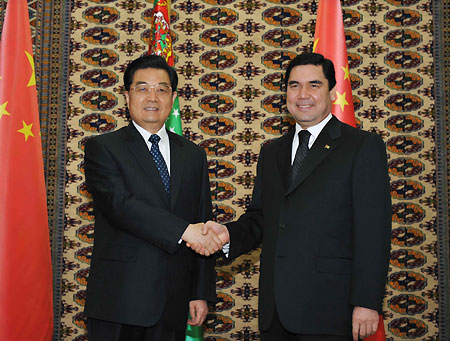 Central Asia welcomed China's foray into their energy-rich region on Sunday as Chinese leader Hu Jintao prepared to open a new pipeline connecting a Turkmen gas field with China's restive Xinjiang region.
Central Asia welcomed China's foray into their energy-rich region on Sunday as Chinese leader Hu Jintao prepared to open a new pipeline connecting a Turkmen gas field with China's restive Xinjiang region.
 Central Asia welcomed China's foray into their energy-rich region on Sunday as Chinese leader Hu Jintao prepared to open a new pipeline connecting a Turkmen gas field with China's restive Xinjiang region.
Central Asia welcomed China's foray into their energy-rich region on Sunday as Chinese leader Hu Jintao prepared to open a new pipeline connecting a Turkmen gas field with China's restive Xinjiang region.
Leaders of Kazakhstan, Uzbekistan and Turkmenistan assembled in the Turkmen capital Ashgabat on Sunday to greet Hu on the eve of a ceremony to commission the 1,833-kilometre (1,139-mile) pipeline that snakes across Central Asia via their countries.
The pipeline marks a new stage in China's involvement in the former Soviet region and represents a snub to Russia which still sees the mainly Muslim region as part of its traditional sphere of influence.
Speaking ahead of Hu's arrival, Uzbek President Islam Karimov said the pipeline was a key step towards diversifying energy exports from Central Asia.
"The geopolitical map is changing ... and Turkmenistan's role will only grow," said Karimov, in power since 1989. "This will help diversify exports of Turkmen energy to the global markers."
Speaking alongside Karimov, Turkmen President Kurbanguly Berdymukhamedov described it as a "unique" project.
"It forms reliable infrastructure and this route will be used to deliver large quantities of gas to China. ... This will increase energy security," he said. Hu and Kazakh President Nursultan Nazarbayev were due to arrive later in the day.
Central Asia, home to some of the world's biggest oil, gas and metals reserves, is at the centre of a geopolitical tug-of-war between China, Russia and the West, all seeking to grab a share of its untapped riches.
The pipeline, starting near a Turkmen gas field developed by China's CNPC, is Central Asia's biggest export route that reaches markets outside Russia and fully bypasses it territory.
With capacity of 40 billion cubic metres (bcm) a year, it will ease Turkmenistan's dependence on Russia, which purchased about 50 bcm a year before the two nations fell out over gas supply terms this year.
The pipeline is expected to reach full capacity in 2012-13.
Hu's visit serves as a rare unifying force for regional leaders who, ridden by rivalries and rows over cross border water and electricity use, rarely meet to discuss matters.
Their willingness to put side their differences and fly to Turkmenistan's remote capital to meet Hu shows their resolve to forge closer ties with their giant eastern neighbour.
China has already stepped up its presence in the region by handing out billions of dollars in loans, snapping up energy assets and building an oil pipeline from Kazakhstan.
In Kazakhstan on Saturday, Hu and his delegation signed a range of investment deals, most detailing earlier agreements between Astana and Beijing, in sectors such as steel, chemicals, renewable energy and reconstruction of a Kazakh oil refinery. [ID:nGEE5BB01D]
Russia's Gazprom (GAZP.MM: Quote, Profile, Research) stopped buying Turkmen gas in April after a pipeline explosion sparked a broader diplomatic row over gas. The move has cost Turkmenistan about $1 billion a month and prompted it to forge closer ties with other nations.
Russia and Turkmenistan have yet to agree on supply terms. As gas diplomacy heats up, Russian President Dmitry Medvedev is due to travel to Turkmenistan later this month for energy talks.
Reuters


